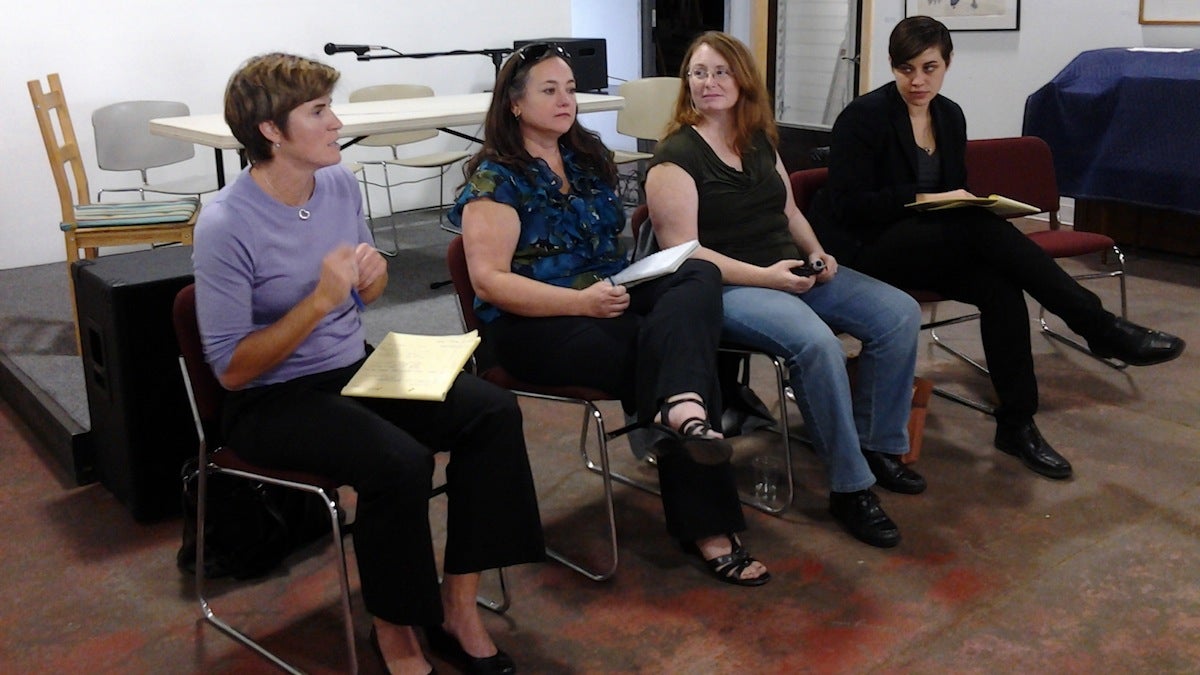ACLU tackles marriage equality questions at Mt. Airy Art Garage

(L to R) Helen Casale, Tiffany Palmer, Mary Catherine Roper and Barrett Marshall speak on Sunday night's panel on same-sex marriage at Mt. Airy Art Garage. (Alaina Mabaso/for NewsWorks)
Mt. Airy partners Melissa Hamilton and Michelle Satchell are considering marriage and parenthood.
Even though Pennsylvania has recognized same-sex marriage since May 20, for many same-sex couples like Hamilton and Satchell, the law is anything but clear.
Speaking up at a special ACLU of Pennsylvania information panel at Mt. Airy Art Garage on Sunday about the new rights and responsibilities of Pennsylvania’s shift to marriage equality, Satchell began to cry.
The couple wants to have children and Satchell, who has had her eggs frozen in the hope of future parenthood, is unable to carry a pregnancy to term. With the help of assistive reproductive technology, Hamilton hopes to give birth to Satchell’s biological child.
If the two marry, will Pennsylvania (and the federal government) automatically recognize them both as the baby’s parents?
As the lawyers on the panel explained, the answer is no. It’s an example of the legal limbo that persists for Pennsylvania’s same-sex partners and parents.
Marriage experts and supporters in the Northwestt
Discussion moderator Helen Casale, of the law firm Hangley Aronchick Segal Pudlin & Schiller and attorney Tiffany Palmer, of the Jerner & Palmer firm on Wissahickon Avenue, both live in Northwest Philadelphia.
Joining them was Barrett Marshall, a staff attorney for the Mazzoni Center, a wide-ranging LGBTQ advocacy organization. Mary Catherine Roper, a staff attorney for the Pennsylvania ACLU, rounded out the group.
Each of the attorneys specializes in issues of family law, particularly relating to Pennsylvania’s same-sex couples.
They were also joined briefly by state Representative Cherelle Parker, who spoke passionately about her support for marriage equality, and her appreciation for local grassroots activists.
“Everything that’s good for our nation usually doesn’t come from those who are elected,” Parker said of ordinary people working for a cause. “It comes from the ground up.”
Pennsylvania’s “strange place”
The panel welcomed a group of about 15 attendees for an avid question-and-answer session.
“We are in a very strange place in Pennsylvania,” Palmer said.
That’s because while everyone can now get married and same-sex couples who previously married out of state are now recognized as married by the state, there still is no statewide anti-discrimination law in place to protect LGBT folks from scenarios like job loss or refusal of service or healthcare coverage, based on sexual orientation.
Marshall’s advice was blunt: “catastrophize.”
In other words, when it comes to the practical details of life, plan for the worst.
According to the panel, even though same-sex marriages are now legally recognized in the state, there are a host of issues, particularly involving parenthood, that still are not clarified by state or federal law, or are poorly understood.
Ensuring parents’ and partners’ rights
For example, if Hamilton and Satchell decide to get married and have a child who biologically belongs to one of them and is birthed by the other, they must still complete a second-parent adoption process to ensure that they are both recognized as the child’s legal guardians, wherever they might travel in the U.S.
It’s a hurdle heterosexual couples, married or not, do not have to face.
“A birth certificate is an administrative document. It is not a court order,” Casale explained of why the form, even if it bears both parents’ names, is not enough to ensure both parents as legally empowered decision-makers throughout the country.
However, the end of the same-sex marriage ban in Pennsylvania has made the adoption process easier and cheaper for married same-sex couples, who as legal spouses, are now allowed to omit a previously mandated home-study phase prior to adoption.
The panelists emphasized same-sex couples’ need for proper medical and financial power of attorney documentation, since many states still won’t recognize their marriages. Same-sex spouses should always be prepared to travel with these documents should anyone (from disapproving family members to hospital administrators) try to wrest legal control from an incapacitated spouse’s partner in a state where same-sex marriage isn’t recognized.
Know the laws
The discussion also examined the legal obligations of marriage and adoption, which are as important to acknowledge as its joys.
Same-sex couples who seek divorce will be subject to the same policies on division of marital assets and alimony as heterosexual couples. And particularly because many same-sex couples come to the altar after many years of accumulating assets and property together (not having had the option to legally marry before), prenuptial agreements are important to consider.
The panelists also emphasized that while a marriage can end, adoptions are permanent. Couples who adopt children together will remain the legal guardians of those children regardless of whether they remain married.
On the financial side, inheritance laws stipulate that a spouse cannot be removed as a life insurance beneficiary without that spouse’s consent, a policy that now applies to all marriages regardless of the beneficiary’s gender.
And for tax and practical purposes, the MAAG panelists also advised careful consideration of how a combination of assets under marriage could affect payments like social security, disability, or educational loans.
‘High points’ of marriage equality
But Pennsylvania’s new status also makes life easier for same-sex married couples: Casale enumerated several “high points.”
For the first time in Pennsylvania, a same-sex spouse can make medical decisions when the other is incapacitated, instead of being a “third-party stranger,” denied information under HIPAA laws.
Married same-sex couples who want to share the deed to their home no longer have to pay the real estate transfer tax to do so.
And in the case of death, a same-sex spouse no longer has to pay a 15 percent estate tax to inherit his or her partner’s property or assets — a benefit that heterosexual spouses have always had.
But for practical, financial, healthcare, and cultural purposes, Pennsylvania has a lot of adjustments to make as the new law unfolds in daily life.
“Everybody’s still getting used to this,” Palmer told NewsWorks. “It’s going to take a little while to sort out.”
Gay or straight, Canale concluded, deciding to wed is not a decision to make lightly. Just because the law now makes it possible for everyone doesn’t mean everyone should take the leap.
“You have to decide if marriage is right for you.”
Correction: An earlier version of this article incorrectly identified the staff attorney for the Mazzoni Center in this story as Barritt Marshall. Her name is Barrett Marshall. NewsWorks regrets the error.
WHYY is your source for fact-based, in-depth journalism and information. As a nonprofit organization, we rely on financial support from readers like you. Please give today.




